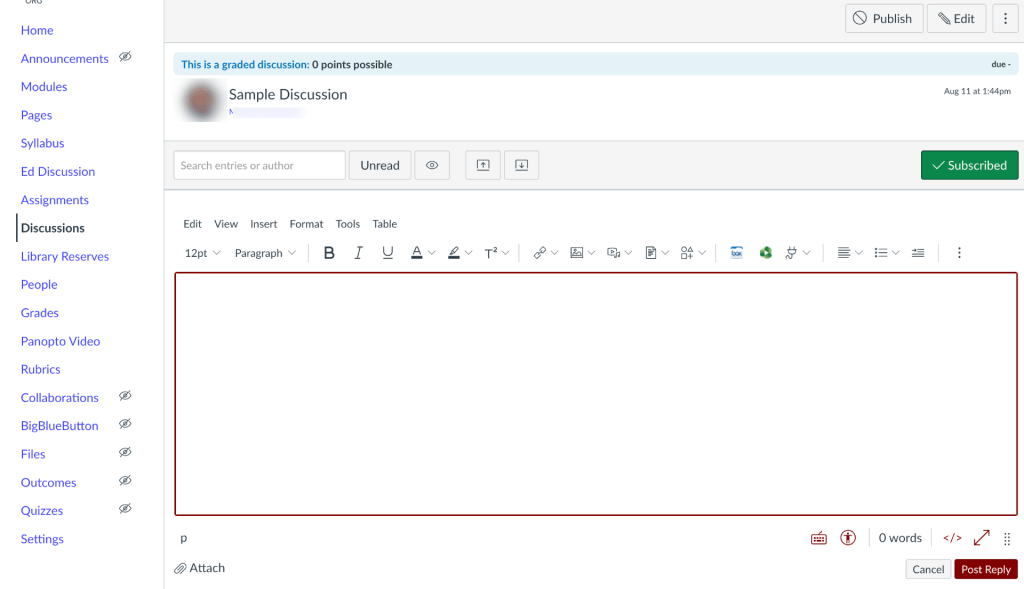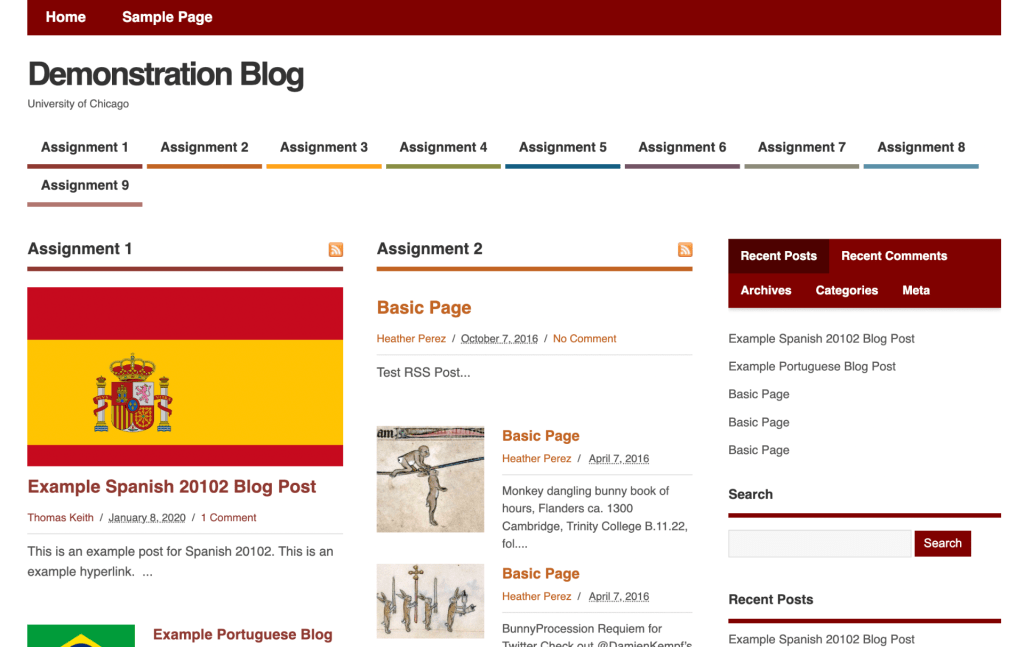Are you considering using asynchronous discussion as part of your course this term? Discussion tools can help you create a vibrant student community, observe progress toward course objectives, and ultimately promote learning more effectively. At UChicago, you have a variety of tools at your disposal for holding asynchronous discussions, and this guide can help you decide which best suits you. The following tools are all supported by Academic Technology Solutions:
Canvas Discussion Boards
This tool offers the traditional discussion board experience most teachers and students are used to. As the instructor, you can promote discussion among your class with detailed prompts, enable threaded replies so that students can respond to each other, and specify dates that individual prompts will be available. Instructors often assign one Canvas Discussion per week in response to a class reading, requiring a minimum number of replies to other students, and sometimes requiring an original post before students can reply to others.

One of the major advantages of using the discussion boards built into Canvas is that you can attach Canvas Rubrics to them. This can be helpful if you want to promote a specific type of discourse; give directions and feedback along the way; and (if desired) assign grades for discussion participation that feed directly into the Canvas Gradebook.
For more information about Canvas Discussions, see our blog post on using Canvas Discussion Boards.
Ed Discussion
While discussion boards invite more substantive, long-form replies, you and your students may be accustomed to an experience like an instant messaging platform. If you’re accustomed to shorter, more dynamic discussions that may take place across multiple simultaneous threads separated by topic, Ed Discussion may be the right tool for you. If you’ve ever used tools like Slack or Discord, you’ll find this tool similarly lends itself well to both asynchronous and more immediate discussion.
Ed Discussion offers some exciting benefits for STEM classes in particular, including runnable code snippets in various languages, syntax highlighting for code, and LaTeX typesetting for math. Students also have the ability to post questions and solicit answers from both classmates and teaching staff. The instructor then has the ability to endorse high-quality student responses and even merge related discussions, creating something of a live-knowledge base for their course.

Also, while Ed Discussion posts do not feed into your Canvas Gradebook or connect to your rubrics, Ed Discussion does have a level of integration with Canvas that makes it easy to set up, and it offers robust analytics that allow you to monitor participation.
If you’re interested in starting with Ed Discussion, please see our quick start guide.
Class Blogs
UChicago Voices is available to all faculty as a tool to feature student writing and invite student discussion in response. Using one of the available WordPress templates, you can build discussion around students’ writing by using class blogs. With class blogs, you can assign and feature student reflections on class material on a rotating basis.

Class blogs are somewhat similar to Canvas Discussion Boards, in that they invite long-form reflection and encourage replies and reactions between classmates. However, you’ll also note that the class blog system tends to center the class’ attention on a single piece of writing, rather than a compulsory post from each student. Also, because they’re built and maintained using WordPress, class blogs also offer greater flexibility and customization than Canvas Discussion Boards, which offer a uniform experience common to most learning management systems. As a website independent of the LMS, a class blog keeps the thoughtful discourse you solicit accessible to readers somewhat longer than Canvas Discussion Boards.
For more insight on how instructors at UChicago have used Voices, check out our post on course blogs.
To request your blog, please complete our blog request form.
Alternative Tools
As ATS-supported tools, Canvas Discussions, Voices, and Ed Discussion have been vetted for accessibility, security, and student privacy compliance. They can also be used by any faculty member at no additional cost to your department. However, you may also have heard of the tools described below, which are not administered or vetted by ATS.
ATS can offer the following information to faculty interested in using these tools, but please be aware that they come with an increased responsibility for the faculty member to ensure that the tools maintain student privacy and support accessibility. While you are welcome to use the tools listed below, please be aware that you are doing so at your own risk. It is important that you ensure these tools maintain student privacy and determine what, if any, cost to your division/department may be needed to use them.
Piazza
You may have heard of Piazza previously as a discussion tool at UChicago. While Piazza is still available, ATS now supports Ed Discussion in its place and encourages its use due to Ed Discussion’s providing similar functionality with fewer privacy concerns.
Slack
Slack has become somewhat ubiquitous among businesses with centrally located and distributed teams alike. It features threaded discussions, accepts a variety of media and custom integrations, and has the advantage of an interface that is familiar to many people. Please be aware that ATS does not currently support this tool, and that there are privacy concerns to keep in mind, as it was not designed with educational use in mind.
Nonetheless, some UChicago faculty have found it useful in their teaching. For a good example, please see Dr. Lara Janson’s presentation from last year’s Symposium for Teaching with Technology.
Discord
Very similar in basic function to Slack, Discord is a tool for online communication that originally was used most heavily among online gamers but has now gained greater popularity. It is generally favored for its robust moderation tools and can be used on both desktop and a mobile app, like Slack.
Upcoming Workshops
If you’re looking for additional support using our discussion tools, please consult with ATS or drop by our Office Hours. ATS is offering a workshop on effective use of course blogs, a workshop on Effective Use of Discussion Forums, and a workshop specifically on Ed Discussion.
Image credit: Werner Moser from Pixabay

